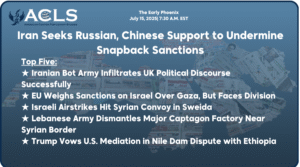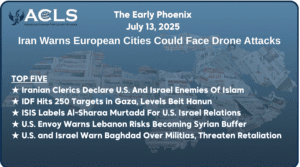December 1, 2023
- Egyptian Foreign Minister Visits Washington to Discuss Gaza Ceasefire. Egypt’s Foreign Minister, Sameh Shoukry, embarks on a visit to Washington to discuss efforts towards a Gaza ceasefire. Egypt asserts its role in facilitating the return of Egyptians from Gaza, countering misinformation about the process.
- Sisi Stresses Need for Palestinian State with Jerusalem as Capital. Egyptian President Abdel Fattah el-Sisi emphasizes the international community’s role in implementing the two-state solution for an independent Palestinian state with East Jerusalem as its capital. Sisi also discusses Egypt’s readiness to coordinate and receive international aid for Gaza, highlighting ongoing efforts to provide humanitarian assistance.
- Egypt Unveils New Weapons Amid Regional Tensions. Egypt reveals advanced weaponry at the “IDEX 2023” international defense exhibition, including the domestically manufactured frigate “El-Gebal” and the missile launcher “Raad 200.” These developments come amid escalating regional tensions, with Egypt facing pressure and challenges from various fronts, including the Gaza conflict and involvement of other actors like the Houthi rebels in Yemen. The showcased weapons enhance Egypt’s capabilities for surface, air, and underwater threats, reflecting its commitment to sovereignty and regional stability.
- Nigerian Army Airstrike Accidentally Kills 85 Civilians. A Nigerian military drone strike mistakenly killed at least 85 civilians in a village in the northwest state of Kaduna on Sunday, as confirmed by the emergency services on Tuesday. The President has called for an investigation into the incident, expressing deep regret and sorrow for the loss of Nigerian lives. The military acknowledged the accidental strike, targeting villagers participating in an Islamic festival, leading to ongoing negotiations between emergency officials and the local community to ease tensions and access the affected village.
December 4, 2023
- Escalating Tensions: Egypt’s Response to Gaza Crisis
As Israeli military operations in Gaza intensify, leading to Palestinian displacement towards Egypt, the situation echoes the 2008 crisis, posing significant humanitarian and security challenges for Egypt.
The United Nations and regional sources report thousands moving from northern and central Gaza to the south, potentially leading to a mass exodus into Egypt and establishing a buffer zone. Egypt’s Ministry of Foreign Affairs strongly opposes the forced displacement of Palestinians, emphasizing adherence to international humanitarian law and the Fourth Geneva Convention. Analysts indicate Israel’s strategy might pressure Palestinians to move towards Sinai, aligning with Israel’s goals to annex Gaza land This could lead to confrontations and further reduce Gaza’s population density. Egyptian military experts, including Major Generals Samir Farag and Nasr Salem, assert Egypt’s readiness to handle potential border crises, balancing humanitarian aid for Gaza with national security. Egypt’s response involves diplomatic efforts for a sustainable conflict resolution. In conclusion, the Gaza situation and its impact on Egypt’s borders underscore the need for balancing humanitarian aid, national security, and regional stability.
December 6, 2023
- Israel’s Plan to Displace Gazans Raises Concerns Over Egypt’s Role. Amid Egyptian efforts to cease the Gaza conflict, reports suggest Israel may negotiate relocating a large number of Gazans to Egypt. The plan, modified to avoid Egyptian opposition, envisions gradual relocation, offering work opportunities in Gulf or European countries. Egypt fears Western, American, and Israeli plans to alter Gaza’s demographics at its expense. While challenges remain, discussions involve convincing Egypt of economic benefits, despite Cairo’s reluctance and the region’s current turmoil.
- Sudan’s Rapid Support Forces Accuse Army of Destroying Main Oil Refinery. Sudan’s Rapid Support Forces (RSF) accuse the army of bombing and completely destroying the key oil refinery, Jeli, near Khartoum, claiming it was targeted by warplanes. The RSF, controlling Jeli since April, produces 70% of the country’s fuel. While the Sudanese army has not promptly responded, RSF condemns the alleged barbaric acts, holding the ousted regime’s remnants responsible. RSF reveals the systematic destruction of vital infrastructure, urging international condemnation for ongoing crimes against the Sudanese people.
December 7, 2023
- Houthi Attacks Threaten Egypt’s Suez Canal Economy. A report from Israel’s “Globes” economic newspaper highlights the economic impact of Houthi attacks near the Bab el-Mandeb strait, stating that Egypt’s economy, heavily reliant on the Suez Canal, faces significant risks. The Suez Canal contributes 2% to Egypt’s GDP, raising concerns in Cairo about potential disruptions to the vital shipping route. The report notes that Egypt’s dependence on the canal has increased, with canal-related revenues reaching a record $9.4 billion in the fiscal year 2022-2023. Israel, while concerned about shipping delays, emphasizes Egypt’s genuine worry about Suez Canal consequences.
- Morocco Plans Satellite Collaboration with Israel Aerospace Industries. Morocco is reportedly considering a partnership with Israeli companies, potentially Israel Aerospace Industries (IAI), to develop a new surveillance satellite, replacing the 2017-launched Mohammed VI-A. The collaboration details, timeline, and costs remain unconfirmed as Rabat has not officially addressed the news.
December 8, 2023
- Egypt Pushes for Palestinian Authority Control in Gaza. Egyptian Foreign Minister Sameh Shoukry advocates for the Palestinian Authority’s governance over Gaza and the West Bank, with the Palestinian people determining the specifics. Egypt, in collaboration with Qatar and the US, is actively working to renew the humanitarian ceasefire in Gaza. Diaa Rashwan, head of Egypt’s General Intelligence Service, highlights Egypt’s role in mediating a ceasefire extension and ending hostilities. Additionally, Egypt warns the US and Israel of the potential influx of Palestinian refugees into the Sinai Peninsula due to Israeli military operations in southern Gaza, expressing concerns over the impact on Egypt-Israel relations.
December 12, 2023
- Egypt Agrees to Reopen Crossing for Aid Inspection with Israel. Egypt and Israel reach an agreement to reopen the Kerem Shalom crossing for inspecting humanitarian aid trucks destined for Gaza. The move aims to alleviate pressure on the existing crossing and facilitate the delivery of medical supplies, baby formula, and water to Gaza.
- Egypt Faces Impending Border Crisis Amid Gaza-Israel Conflict. Despite Egypt’s official rejection of forced displacement, concerns grow about its ability to resist external pressures. The international community, including the UN and regional figures, warns of a potential collapse in Gaza, increasing the risk of mass migration towards Egypt. The U.S. vetoed a UN resolution for an immediate Gaza ceasefire, adding complexity to Egypt’s role in the escalating crisis.
December 13, 2023
- Biden Urges Sisi to Open Border Gateway for Gaza Palestinians. President Biden, speaking at the White House during the Jewish festival of Hanukkah, publicly asked Egyptian President Sisi to ensure the opening of the border for Palestinians in Gaza, despite prior assurances against forced displacement.
- Intense Israeli Airstrikes Near Egypt Border, Escalating Clashes in Khan Yunis. Fierce Israeli airstrikes target Egypt’s border areas in Rafah, while intensified fighting unfolds in Khan Yunis. Israeli forces advance into Khan Yunis, seizing significant portions and engaging in demolition and destruction in central areas. The military also entered the non-operational Kamal Adwan Hospital in Jabalia, causing casualties.
- Why Doesn’t Egypt Use International Support to Open Rafah Crossing? Despite international support, a UN delegation’s visit to Rafah highlights Egypt’s reluctance to sustainably open the crossing for humanitarian aid to Gaza, hindered by Israel. Challenges include Israeli restrictions on aid trucks and the evacuation of casualties. The political will to confront Israel’s opposition remains a key obstacle. Egypt’s former official cites the Egyptian government’s lack of political will and emphasizes the urgency of facilitating aid without waiting for Israeli approval.
December 14, 2023
- Navigating Turbulent Waters: Egypt’s Balancing Act in the Israeli-Gaza Conflict. Despite the escalation of Houthi attacks in the Red Sea, assurances from Egyptian experts and officials suggest the Suez Canal’s security remains robust. Major General Nasr Salem, alongside Dr. Muhammad Daoud, underscores the effectiveness of American and multinational CTF forces in safeguarding the Canal. While potential disruptions to shipping through the Bab al-Mandab Strait are acknowledged, the primary target of these threats are Israeli ships, which do not typically traverse the Suez Canal.
Israel’s decision to increase gas exports to Egypt by 500 million cubic meters annually, although not publicly declared, strengthens economic ties between the two nations. This move signifies a deepening of geopolitical relations amidst regional tensions, offering economic benefits like increased tax revenue and foreign currency influx for Israel, while securing a steady gas supply for Egypt. However, a leaked audio recording from Reporters Without Borders sheds light on another aspect of Egypt-Israel relations. It reveals Egypt’s efforts to block journalist access to Gaza, potentially to maintain favorable relations with Israel and manage regional dynamics.
The economic implications of the Gaza conflict on neighboring Arab countries, including Egypt, are significant. A UN study forecasts a substantial financial toll, with potential losses of $10.3 billion or 2.3 percent of the collective GDP of Lebanon, Egypt, and Jordan. This economic strain underlines the necessity for Egypt to navigate its diplomatic and economic relations carefully, particularly with Israel, to mitigate potential economic fallout and maintain regional stability.
December 15, 2023
- US Commander General Kurella’s Active Role in Addressing Middle East Security Concerns. Lieutenant General Michael Eric Kurella, the Commander of the US Central Command (Centcom), has been actively engaged in the Middle East, as evidenced by his recent visits to Egypt and Jordan. During his time in Egypt, General Kurella met with Lieutenant General Osama Askar, the Chief of Staff of the Egyptian Armed Forces. In Jordan, he held discussions with Major General Yousef Ahmed Al-Hunaiti, the Chairman of the Jordanian Joint Chiefs of Staff, and his team. These meetings focused on addressing current security issues within the US Central Command’s area of responsibility. General Kurella’s visits, including a trip to the Rafah border crossing in North Sinai last June, underscore his involvement in understanding and addressing the security concerns of key regional partners, offering him insights into the region from the perspective of these allies. Concurrently, both Egypt and Jordan have expressed grave concerns over an alleged Israeli controversial plan to evacuate Gaza residents to neighboring countries.
- Efforts to Enhance Security and Stability in South Sudan: A Comprehensive Approach. UAE’s Amira Al-Hafiti Urges Comprehensive Strategy for Sudan’s Stability. Highlighting the need to tackle violence’s root causes and promote peace, Al-Hafiti calls for strengthened security and societal structures in Sudan. She commends the UNMISS mission’s role in civilian protection and reconciliation, and stresses the importance of women’s involvement in elections and societal development, amid Sudan’s complex humanitarian challenges.
December 19, 2023
- Sisi Third Presidential Term. Egyptian President Abdel Fattah al-Sisi, after securing a third presidential term, highlighted the challenges facing Egypt, with the Gaza war topping the list. Sisi emphasized the need to address the threat to national security posed by the conflict on the eastern borders and its broader implications for the Palestinian cause. He commended the unprecedented voter turnout in the elections, describing it as a rejection of inhumane wars and a demonstration of unity. Sisi pledged to continue building a new republic, emphasizing a democratic state that prioritizes human development and national security.
- Egypt Rejects Joint Forces with Israel on Gaza Border. Egypt has rejected deploying joint forces with Israel along the Philadelphi Corridor on the Gaza border. Recent Israeli shelling near the area led to Cairo’s dissatisfaction, as it violates a bilateral agreement requiring prior authorization for military actions. Egypt asserts the region is tunnel-free. The issue was reportedly discussed in a recent meeting between Israel’s Shin Bet chief and Egyptian officials.
- Egyptian Ministry of Transport Explores Partnership with Saudi National Shipping Company. Egypt’s Minister of Transport, Kamel El-Wazir, and the head of the Suez Canal Authority, Osama Rabie, discussed forming a partnership between the Egyptian Ministry of Transport, the Suez Canal Authority, and the Saudi National Shipping Company (Bahri). The collaboration aims to enhance maritime transport cooperation, including the possibility of shipbuilding and maintenance projects in collaboration with Egyptian transport entities.
- Egypt’s Debt Diplomacy: Israel’s Controversial Proposal. Israel contemplates settling Gazans in Sinai, Egypt, in exchange for canceling Egypt’s external debt. The proposal raises concerns over the manipulation of debt for political gains. Egypt, facing a severe economic crisis and high external debts, may consider the offer, impacting its relations with the pro-Palestinian population. This tactic echoes historical instances where debt cancellation influenced political compliance, revealing the exploitation of economic leverage for geopolitical objectives.
- Israeli Gas Imports to Egypt Exceed One Billion Cubic Feet Daily. Israeli gas imports to Egypt have surpassed one billion cubic feet daily for the first time since their resumption last month, according to Bloomberg. The influx increased from an average of 850 million cubic feet daily last month. Israel’s Energy Ministry mentioned that partners in the Tamar offshore gas field can export up to an additional 500 million cubic meters annually to Egypt.
December 20, 2023
- Houthi Threats Prompt Shipping Companies to Rethink Suez Canal Use. Ongoing Houthi attacks near Yemen prompt shipping companies to suspend Suez Canal transit, risking significant daily losses for Egypt and potential shifts in trade routes, driven by concerns for vessel safety amid regional conflicts.
- Egypt Declares Failure of Ethiopian Renaissance Dam Talks, Asserts Water Security Rights. Egypt announces the collapse of the latest round of negotiations on the Ethiopian Renaissance Dam. Egypt retains the right to defend its water and national security in the face of perceived threats. The dam, a source of regional tension since Ethiopia began construction in 2011, poses a vital threat to Egypt, relying on the Nile for 97% of its water needs.
- Egypt Inks $4 Billion Green Hydrogen Project Deal with Aqua Power Saudi Arabia. Egypt signs a framework agreement with Aqua Power Saudi Arabia for a $4 billion investment in a green hydrogen project. The plan outlines the development of the initial phase, aiming for an annual production capacity of 600,000 tons of green ammonia, with intentions to expand to a million tons in the second phase.
- Egypt Explores Issuing Bonds in Gulf Currencies Amidst Rising Funding Costs. Egypt is considering issuing bonds in Gulf currencies, facing challenges of high funding costs due to credit rating downgrades and tight monetary policies. The move aims to secure reasonable financing, with the country grappling with increased borrowing expenses. Egypt seeks coordination with consultants and lawyers for the potential issuance, highlighting the urgency in light of the current economic pressures.
December 21, 2023
- Iranian Hackers Target African Telecom Companies, Including Egypt. A security report reveals that Iranian hackers, known as MuddyWater, targeted telecommunications companies in three African countries: Egypt, Sudan, and Tanzania. This marks the first time the Iranian group has focused on African institutions, with previous attacks primarily in the Middle East.
- Former Israeli Official Warns of Hamas Leaders Possibly Fleeing to Egypt. Following intensified Israeli military operations in Khan Yunis, some former Israeli officials have warned of Hamas leaders potentially escaping to Egypt through underground tunnels. Despite many tunnels being destroyed in 2015, concerns persist about the situation.
- Red Sea Nations Share Responsibility for Safeguarding Navigation Freedom. Egyptian Foreign Minister Sameh Shoukry emphasized that the Red Sea nations bear the responsibility to protect it and ensure freedom of navigation. Egypt continues to collaborate with partners to secure suitable conditions for navigation freedom in the Red Sea, in response to rising concerns over Houthi attacks.
- Egypt Mediates “Difficult” Gaza Ceasefire Between Hamas and Israel Demands. The United States is engaged in “very serious” negotiations for a new ceasefire in Gaza and the release of more Israeli hostages. However, reaching an agreement remains uncertain due to Hamas’ insistence on a complete end to the Israeli offensive in the Palestinian territory. Ismail Haniyeh, the head of Hamas’ political office, visited Egypt for talks, and other Palestinian factions are also discussing an end to the conflict.



